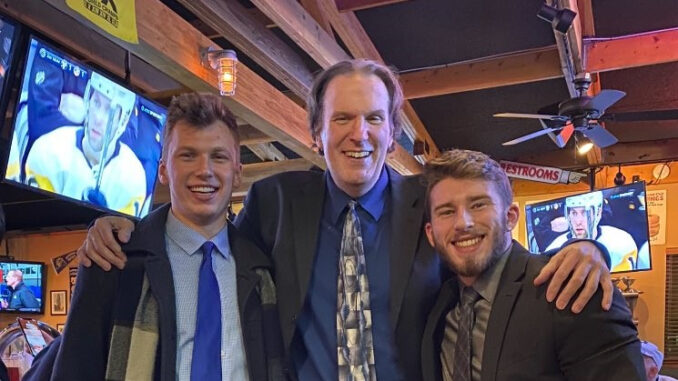
Spencer Thomas & Emma Polen | Sports Editor & Editor-in-Chief
Sean Moloney, an assistant coach for Duquesne’s hockey team, died on Jan. 20, the team announced. He was 53. Moloney spent five years as the program’s goalie coach, where he made an inspiring impact on players and coaches alike despite his declining health.
Born in St. Catherine’s, Ontario, Moloney moved to Pittsburgh at a young age, where he began playing goalie. He wound up playing juniors in Canada, but his legacy in hockey would be formed once he unlaced his skates.
His storied coaching career spanned several decades, where he provided instruction to NHL goalies, and even published an instructional book on the position.
Head Coach Conrad Waite worked closely with Moloney for six years and called his impact on the team “immeasurable.”
Waite played at Duquesne from 2006-2009, and then came back to coach in 2016. In the years between his seasons as a player and a coach, there were eight different head coaches, he said. Stability was one way Waite believed he and Moloney helped the team succeed, Moloney being the team’s longest tenured assistant coach.
Moloney coached at the club level at several schools in Pennsylvania, before landing with Duquesne in February of 2018. In that position, he became the de-facto lead on recruiting netminders for the program. That’s how he came in contact with Robbie Halyama.
Halyama was in high school, looking for a team he could call home. Out of the blue, he got a phone call from Moloney, even though they had never met. The pair spent over an hour on the phone together, and by the time they finished talking, Halyama was sold. Halyama never had a goalie coach growing up, and says that he could immediately sense how deeply Moloney cared and wanted to see him succeed.
“He saw something in me as a player that I didn’t see in myself,” the sophomore said. “He gave me a chance to be a college hockey player, an opportunity that I might not have gotten otherwise.”
But, even with goalies who ended up choosing another college, Moloney stayed in touch. When the condolences started streaming in, Waite was surprised to learn how much of an impact Moloney had had on players who did not even participate in the Duquesne hockey program.
“To hear about these friendships and relationships that had continued,” Waite said, “it’s all just a testament to who he was as a person and, more importantly, just how he connected with those guys.”
Matt Doman, captain of the Duquesne’s men ice hockey team from 2020-2022, said that the team had a losing record until Moloney showed up, and the team needed a goalie coach.
Alex Neverve was the team’s third-string goalie at the time. Moloney joined the team, and turned the 5-foot-4-something into a force to be reckoned with, Doman said, taking the starting spot that same season and then taking the team to the playoffs.
“He [Moloney] would just dig up these kids and his entire career was a storied history of finding a gem that somebody else didn’t believe in and then turning out to be correct, largely because, partially because of his own hands and his ability to coach them,” said Coach Waite.
In 2006, Moloney was diagnosed with Stevens-Johnson syndrome, a rare skin condition. He was given just a couple years to live.
Every day, Moloney came to the rink eager to teach and mentor goalies through their formative years. In recent years however, he had to overcome much more to do so. He had to have a toe removed, which escalated into the amputation of his entire foot, and finally, his leg.
Despite that, he carried on, turning bad news aside like he was back on the ice, saving shots.
“It was really impressive watching him not care,” Halyama said. “He didn’t give a [expletive] about the illness or his health or where he was staying. All he cared about was putting us in a position to succeed, and that resiliency is something that I have to carry with me.”
It would have been easy, with the cards he’d been dealt, for Moloney to simply fade away. He didn’t let that happen. He provided on-ice instruction as long as he could, and then shifted into helping his goalies examine film. In his final months, when he was sharing a nursing facility with his mother, Moloney would coach his players over the phone.
“He was one of the most positive people I’ve ever met,” Halyama said. “He always found the good in me in others, in himself.”
Now that Moloney is gone, those who knew him are left in awe of the man he was, especially in his later years.
“The one thing that always surprised me is just how much he loved being a part of the program,” Waite said. “Given where else he goes and everything else that he had done, he chose to spend his last few years with us.”
This Saturday, there will be a celebratory gathering in Moloney’s honor of coaches, players and more whose lives were touched by his impact on and off the ice. After Duquesne’s first goal, fans are encouraged to toss a teddy bear onto the ice, which will be donated in Moloney’s memory.
No one could sum up Moloney’s memory better than Matt Doman, captain of the Duquesne’s men ice hockey team from 2020-2022: “There’s a lot of people that want to throw around like ‘legend’ or ‘goat’ … Coach shone through.”
“He was one of one.”
